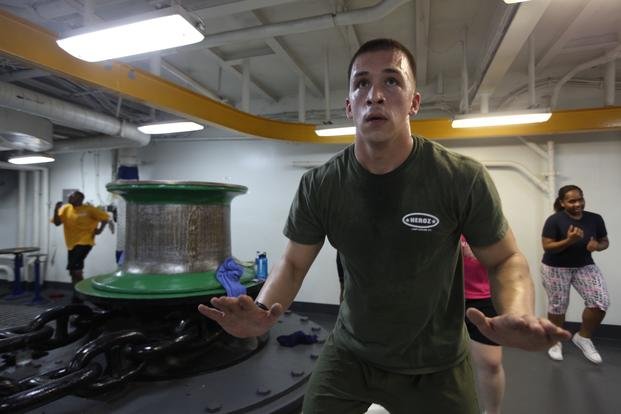Many people seem to be born with a desire to serve their country and community, and they make daily personal sacrifices to better the lives of others. Here is a question from a Marine preparing to serve his community in law enforcement.
Hey Stew. I am a Marine with 6 years active duty. I recently got out to join a local police unit in my hometown. After service, all I have done is lifted weights. How would you recommend preparing for a local police academy? Thanks, Jimmy.
Jimmy, thanks for your continued service to your community. There is nothing wrong with taking a few cycles away from the running and rucking of the Marine Corps and getting in the weight room to rebuild yourself. However, cardio will be tested by most local police academies, and you need to get that part of your fitness back on track.
Your law enforcement unit's requirements could be as difficult as the Marines or easier than other branches of service. You should first gain some intelligence on the fitness test you'll take to qualify for the job, as well as the tasks, events and training required at the academy.
My initial advice is to get back into a calisthenics and cardio cycle. Depending on your athletic and military history, you may find that taking time off from weight training will be refreshing as you work toward getting back to your previous times and scores on PT tests. The amount of time you will need to renew your abilities for cardio endurance and muscle stamina is strictly up to your abilities and the requirements of your future unit.
Current Size
If you need to lose weight, it's easier to accomplish during the calisthenics and cardio cycle with some adjustments to your food intake. However, if it is just a matter of regaining something close to your old USMC fitness levels, then eat for energy as the high reps and longer cardio events will require it.
Back to Running
If you have only been lifting for the past year or so, the strength you've gained will be well-utilized in your future training. However, you still must pass running tests and be able to run everywhere from A to B during your training day. You should not start back running where you left off in the Marine Corps. Treat yourself like a beginning runner and avoid many of the overuse aches, pains and injuries that can come when starting an aggressive running program. See ideas for treating yourself like a beginner runner (at first).
Strength vs. Muscle Stamina
Dropping the weights for a cycle and focusing solely on calisthenics will give you a needed break from heavy lifting and help you handle the long days of physical activity during law enforcement candidate training. Many academy classes are modeled after a military boot camp, so prepare accordingly and remember the things that were tough for you in your Marine boot camp and avoid the pain of having to endure those issues again.
Once you have aced the fitness test to get to the academy, then focus on preparing to get through the academy training by specifically preparing for police academy events. Usually there are group PT and military-style runs, grappling, obstacle courses and shooting. Since you already have several years of experience in so many of these events, the academy will be a nice refresher course for you.
As a military veteran, you will likely be one of the leaders in the class, so take that added responsibility seriously. Be a helpful classmate to candidates who are new to many of the skills you have honed for the last several years in the Marine Corps, since your experience is largely why the local police and fire departments are so eager to hire veterans. You are representing the Marine Corps as well as yourself.
After the academy, you can get back into lifting again, put on some size and be an asset to your community. You will still need to keep up all the elements of fitness: strength, power, grip, speed, agility, muscle stamina, endurance, flexibility and mobility. If you are sitting in a police car for many hours a day, your need to keep up your mobility and flexibility cannot be stressed enough.
Thanks again for your continued service. Good luck with the new mission.
Stew Smith is a former Navy SEAL and fitness author certified as a Strength and Conditioning Specialist (CSCS) with the National Strength and Conditioning Association. Visit his Fitness eBook store if you're looking to start a workout program to create a healthy lifestyle. Send your fitness questions to stew@stewsmith.com.
Want to Learn More About Military Life?
Whether you're thinking of joining the military, looking for fitness and basic training tips, or keeping up with military life and benefits, Military.com has you covered. Subscribe to Military.com to have military news, updates and resources delivered directly to your inbox.


















